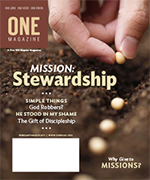
February-
March 2017
Mission: Stewardship
------------------
|






Is estate planning robbing God or doing right?
God Robbers?
By Bill and Brenda Evans
For
some reason, highway robbery comes to mind when I think of estate planning. Maybe it’s because of Malachi’s fiery question to the exiles who had
returned to Jerusalem after 70 years in Babylon. They had been back in
their land for about 100 years and had lapsed into their old ways:
satisfied, well fed, stingy, and hard-hearted. So, Malachi bellowed
at them, “Will you rob God?” (3:8) Maybe he also pointed a skinny, righteous finger in their faces as he bellowed. We imagine he did, anyway.
The truth is, the Israelites were highway robbers of sorts, like the thieves on horseback in Great Britain during the 1600 and 1700s who waylaid and robbed travelers. These British “knights of the road” were glossed over, glamorized, even considered socially superior to others who had no horses, so traveled and robbed on foot. It’s amazing how we put a pretty shine on our sins. Americans aren’t exempt either. In the Old West, highway robbers were simply called road agents. Aussies called theirs bushrangers. But by any other name, robbers were robbers. Still are.
Malachi, in the first line of his book, called his message “the burden of the word of the Lord to Israel by Malachi” (italics ours). His words were, indeed, heavy and harsh. The Lord found no pleasure in His people, Malachi revealed. They were indifferent, impure, and disobedient. God was angry, thus His accusation: “You have robbed me.” He was talking about sacrifices and offerings when He said it (3:9).
Our giving matters to God. How we give matters. When we give matters. Why we give matters. God’s word to Malachi and His people makes it clear that sometimes God’s people resort to “highway robbery,” socially acceptable to some, but still robbery as far as God is concerned. Wonder where the idea came from that we should simply divide our estate among our children? A good and wise estate plan can take us out of that category, so let’s look at who needs an estate plan and why. Everyone should consider at least tithing on his or her estate.
WHO Needs an Estate Plan?
Anybody who...
-
Wants to simplify things for heirs.
-
Wants to keep the courts out of family business.
-
Wants to be protected if incapacitated.
-
Wants to avoid court-appointed guardianship.
-
Wants to bless and support FWB ministries.
-
Will eventually die.
-
You, me, all of us, in other words.
WHY Have an Estate Plan?
Because we have scriptural precedents and mandates for that. Old Testament law was emphatic regarding how property was to be held, used, and passed along. Call it God’s estate planning. The Law was clear, too, on compassion and generosity to God’s work beyond one’s own family, especially those in genuine need. Providing for Levitical temple workers and priests responsible for their nation’s spiritual life was part of that requirement as well. God’s work was carried on because God’s people gave.
The New Testament is also just as clear: take care of those in need and provide for our Christian ministries. Free Will Baptist Foundation, working with Cornerstone Estate Planning, helps all of us Free Will Baptists find ways to do that.
Another way of thinking about why we need an estate plan is to consider our God-given instinct to protect and provide for those we love and for whom we are responsible: ourselves, our families, and our denominational ministries. The first two, ourselves and our families, are easier because humans are naturally self-serving.
The good thing is, with a purposeful estate plan we can also protect and provide for the FWB ministries we love. Maybe we should call that The Triple-Do-Right-Plan: the right estate plan, at the right time, for the right purpose.
At the end of 2016, in at least 19 states and 250 churches, more than 1,400 FWB families had created estate plans that will take care of them and their families but also will direct $15 million to support and extend FWB ministries.
Mike Wootton of Cornerstone says these 1,400 families have caught the right vision. “I want to brag on those who have seen what they can do with a good estate plan,” Mike says. “These brothers and sisters are looking down the road. They see ahead to what they can do for the Kingdom work in the future by simply making a good plan now. They are ‘keeping the wolves at bay,’ especially those in sheep’s clothing, and supporting the Free Will Baptist ministries they love after their deaths.”
All kinds of FWB ministries are benefitting from the faithfulness of those who made estate plans that continue to support the Lord’s work after their deaths. As God’s children, they believe in giving both tithes and offerings. We all do, don’t we? But sometimes we forget about the increases we have enjoyed in investments and properties over the years. What plan do we have in place to honor the Lord with our tithes and offerings on that increase after our deaths?
These 1,400 families have decided that stewardship of their assets is not just about the here and now. Let’s call them Triple-Do-Righters, because they have seen that it’s about all of their time, even the future, and they’ve established a plan to take care of that.
Estate Planning Seminars
Free Will Baptist Foundation works through local churches to help individuals accomplish their estate planning goals. Free Will Baptist Foundation Director David Brown states, “We go at no charge to a church and teach stewardship and estate planning. No church is too large or too small. Then we follow up with individuals who want more information. And, by the way, no individual estate is too large or too small for our help.”
Questions addressed include:
-
What is probate?
-
What are the limitations of wills?
-
What happens if you are incapacitated?
-
What are the negatives of joint ownership?
-
What is durable power of attorney?
-
What is a revocable living trust?
All those areas are related to how we deal with what we own. One of the targeted topics is to explain, in full, a revocable living trust—a legal document that, like a will, contains instructions for what we want to happen to our assets when we die.
Revocable Living Trusts help you:
Keep control of your assets.
Prevent the court from controlling assets if you become incapacitated.
After your death, avoid probate, save time, and maintain the privacy of your beneficiaries.
WHO controls the trust?
You do. If you and your spouse are co-trustees, either will receive instant control if the other becomes incapacitated or dies. If something happens to both of you, or if you are the only trustee, the successor trustee you have named in the trust will step in at your death.
For those individuals or families who decide to choose the Free Will Baptist Estate Plan, the legal fee is $2,300. That includes services the staff gives to help an individual or family establish their plan, as well as help at the end after a trust holder dies. The Foundation will assist with advice and guidance to survivors as well.
Why have the right estate plan? In order to be Triple-Do-Righters rather than highway robbers, make the right plan, at the right time, for the right purpose. Don’t rob God!
About the Writers: Bill and Brenda Evans live in Ashland, Kentucky. Bill is former director of Free Will Baptist Foundation, and Brenda is a retired English teacher. Visit www.fwbgifts.org for more information on planned giving that benefits your favorite ministry.
|
|

